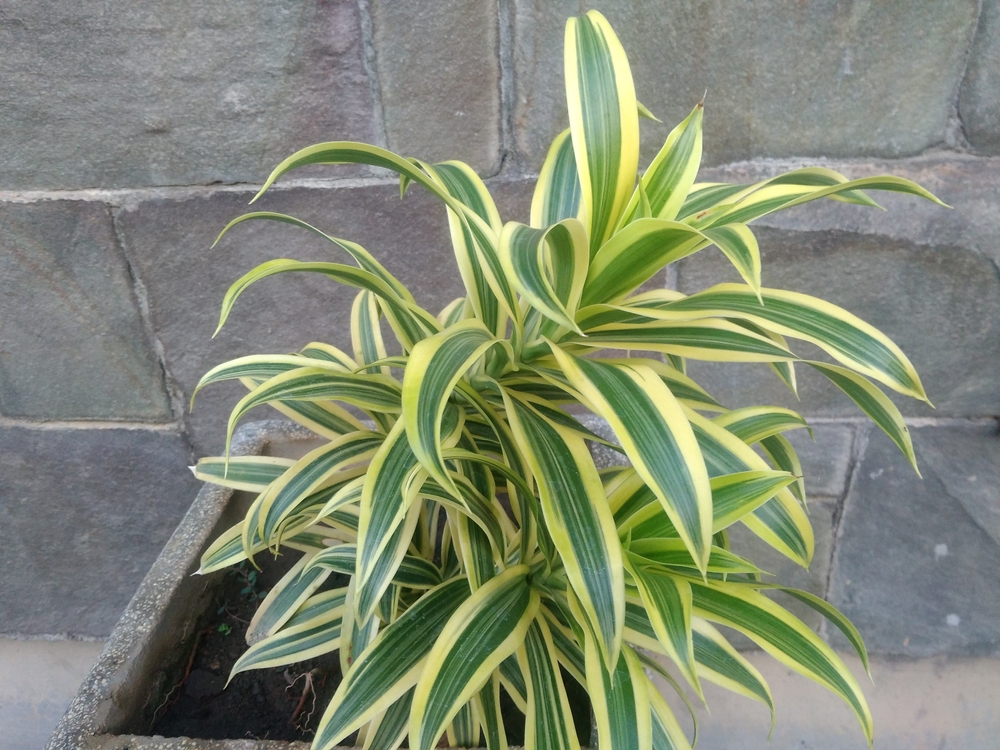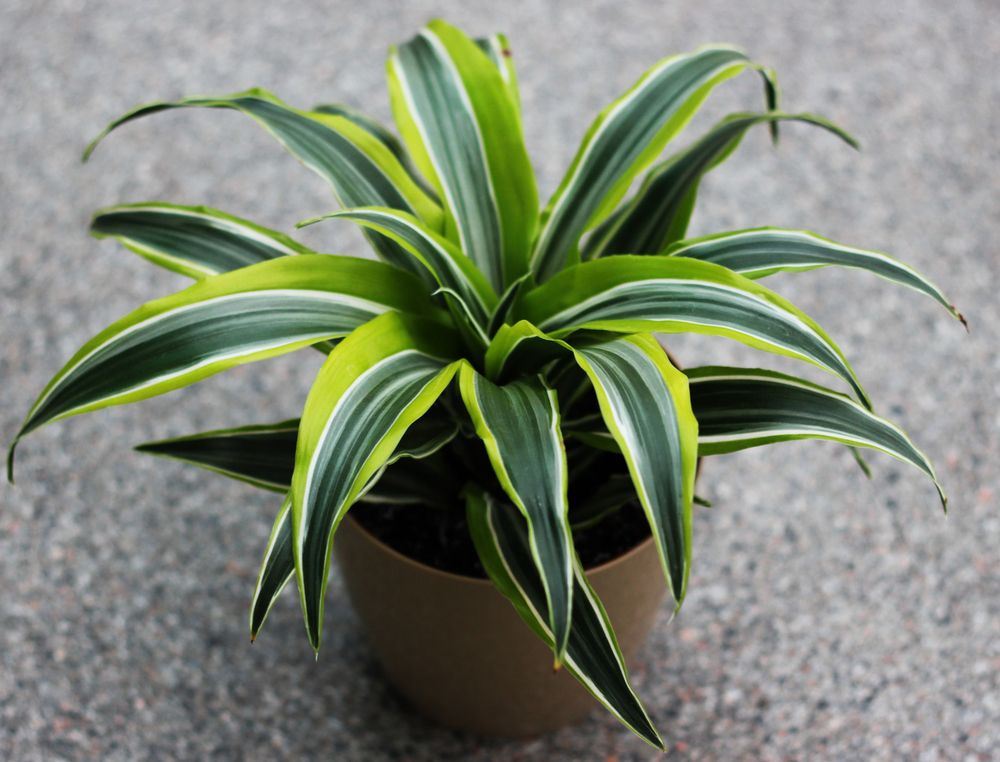Are you looking for an eye-catching houseplant different from the popular Monstera? Then maybe you’ll be interested to learn more about Dracaena Lemon Lime. The name of this plant derives from its bright yellow and green striped leaves that resemble the color of the lime fruit.
Despite not being a challenging plant to grow, you should be familiar with its needs and requirements to have it thrive in your home.
And if you want to learn about them, read on! In this Dracaena Lemon Lime essential guide, you’ll get all the information you need about this plant.
| Botanical Name | Dracaena deremensis |
| Common Name | Dracaena Lemon Lime, Dragon Blood Tree, or Lemon Lime |
| Plant Type | Perennial |
| Flower Color | As a houseplant, dracaena lemon lime rarely produces flowers. However, if you are lucky, you may be able to see tiny white flowers at least once in your plant’s life cycle in the summer. |
| Size When Mature | Between 4 and 7 feet tall. Its leaves can measure up to 2 feet long. |
| Bloom Time | Summer |
| Sun Requirements | Bright, indirect light |
| USDA Hardiness Zones | 10-12 |
| Soil PH Range | Around 6.0 and 6.5 |
| Soil Type | Fertile, well-draining, and aerated |
| Water Needs | Medium |
| Native Area | Tropical Africa |
What you Need to Know About Dracaena Lemon Lime
Dracaena Lemon lime is a tropical perennial that performs excellently as a houseplant. Its long leaves are variegated and grow on attractive vertical branches can add an elegant touch to any location. So, if you want to add more green to your home, you should consider getting this plant.
But be careful if you have pets: if ingested, dracaena might cause severe issues to cats and dogs. Symptoms of intoxication include vomiting, diarrhea, drooling, and loos of appetite. Of course, that doesn’t mean you can’t add a dracaena lemon lime in your home if you have a pet. What it means is that you must prevent your animals from munching on it.
How to Care for Dracaena Lemon Lime
Luckily, caring for a dracaena lemon lime isn’t as challenging as you may expect looking at it. Indeed, as long as you provide it with what it needs to thrive (enough water, adequate lighting, and proper nutrition), you won’t encounter too many problems.
And the best part is that if you don’t have much space in your living room for a 7 feet tall plant, you can keep it to a tabletop size by pruning it regularly.
But jump to the following sections to learn all the tips on growing a thriving dracaena lemon lime.
Light
One of the keys to success when adding a dracaena lemon lime to your interiors is to ensure your plant gets the sunlight it needs. Avoid exposing it to the direct sun, which may scorch its delicate leaves and cause discoloration.
However, that doesn’t mean you should place it in a dark room. Indeed, too little light will make your plant leggy and brown. And most of its attractiveness lies in its foliage! Instead, locate your plant next to a window with sheer curtains. If you don’t like the idea of blocking the sun this way, place your plant a couple of feet away from the window.
Consider rotating your plant once in a while to ensure it grows evenly. While this may not be a requirement for your dracaena’s health, it will affect its aesthetic appeal.
Water and Soil Needs
Watering is the second most crucial factor for keeping your plant thriving. While dracaena lemon lime plants are generally resistant to drought, they will perform better with regular watering. However, remember to give it enough moisture without overwatering your houseplant. Indeed too much humidity will cause plenty of problems.
And the easiest way to do so is to feel the soil with your fingers before watering your plants: if it isn’t dry yet, wait!
You may be happy to learn that this variety of dracaena isn’t too fussy about soil conditions. Indeed, it will adapt to most substrates. However, if you want to minimize issues, consider adding it to a well-draining and fertile potting mix. Ideally, the pH should be between 6.0 and 6.5.
Don’t forget that you may have to transplant your plant to a larger container as it grows. Usually, that may happen every 2 to 3 years, depending on the size of your pot.
Temperature Requirements
While Dracaena Lemon Lime will survive outdoors in USDA hardiness zones between 10 and 12, you’ll have no issues growing it as a houseplant if you keep your home’s temperature stable.
This plant performs best at temperatures between 65 and 75°F, so avoid exposing it to lower temperatures.
Fertilizer
Fertilize your dracaena lemon lime during its active growing season (spring and summer). For better results, use a liquid product to optimize the roots’ access to nutrients. Of course, follow the instructions you find on the product label to avoid over-fertilization, which may cause plenty of damage to your dracaena.
Common Diseases
With regular maintenance, your plant will rarely suffer from attacks from pests. However, spider mites and mealy bugs might still visit your dracaena. For this reason, you’ll have to check your plant often and take proper measures to minimize the spread of infestations.
Also, we recommend wiping your dracaena lemon lime leaves with a moist cloth to keep your plant under optimal growing conditions. Indeed, doing so will minimize the accumulation of dust and debris on your plant.
Dracaena Lemon Lime Propagation
But what if you would like to create more plants from your dracaena? We have good news for you! Indeed, propagating this plant isn’t challenging. One of the most effective methods is to do so by stem cutting.
Snip a 4 to 6 inches long stem and dip it into rooting hormone before placing it in water or a well-draining potting mix. Keep the plant moist (or regularly change the growing medium) for a couple of weeks. During that time, your seedlings will grow roots, allowing you to transplant your dracaena to a larger container.
And there you have it! We bet you never thought that propagating a plant was that easy! These techniques can also be used for other types of Dracaena, including the spiked dracaena.


